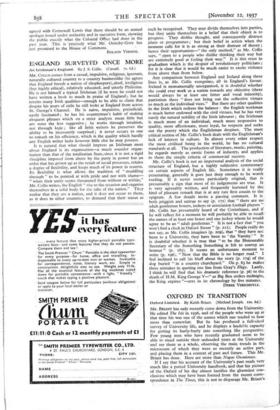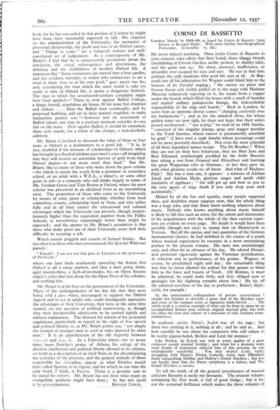OXFORD IN TRANSITION
Oxford Limited. By Keith Briant. (Michael Joseph. Pas. 6d.)
MR. BRIANT has only recently come down from the University. He edited The his in 1936, and of the people who were up at that time his was one of the names which one tended to hear more than somewhat. But he has produced a full-sized survey of University life, and he displays a laudable capacity for getting its hurly-burly into something like perspective. Few young men who have recently graduated. seem to be able to stand outside their unhooded years at the University and see them as a whole, observing the main trends in the microcosm of which they were so recently an active part, and placing them in a context of .past and future. This Mr. Briant has done. Here are more than Nugae Oxonienses.
If I say that his account of the University's past reads very much like a potted University handbook, and that his picture of the Oxford of his day almost justifies the gloomiest con- clusions which may have been formed from the recent corre- spondence in The Times, this is not to disparage Mr. Briant's book, for he has succeeded in that portion of it where he might have been most reasonably expected to fail. His chapters on the administration of the University, the anomalies of proctorial dictatorship, the profit and loss of an Oxford career, and " Things to come " are a balanced, mature and well- considered set of judgements. As a contemporary of Mr. Briant's I feel that he is unnecessarily pessimistic about the rowdyism, the sexual extravagances and aberrations, the' drinking and the slothfulness of modern Oxford life. A. statement like " Some restaurants are turned into a bear garden, and any resident, traveller, or visitor who endeavours to eat a
meal in them does so at his own goes much too fir, and, considering the view which the outer world is only too ready to take of Oxford life, it seems a dangerons blemish. The days to which the seventeenth-century complaint might have been applied—" There is, over against Balliol College, a dingy, horrid, scandalous ale house, fit for none but draymen and tinkers. . . . Here the Balliol men continually, and by perpetual bubbing, add art to their natural stupidity, to make themselves perfect sots "—however just an assessment of Balliol talents one may in a partisan moment consider it—are fast on the wane. Over against Balliol, it should be remarked, there now stands, for a token of the change, a non-alcoholic cafeteria.
Mr. Briant is inclined to discount the value of three or four years at Oxford as a preliminary to a good job. " It is, in fact, doubtful if the increase of scholarships to Oxford, which has brought in a flood of jubilant poor men's sons—all imagining that they will receive an automatic harvest of gold from their Oxford degree—is not more cruel than kind." But Mr. Briant, like so many of those who write about the poor scholar —by which is meant the youth from a grammar or secondary school, or an adult with a W.E.A., a miner's, or some other grant in aid—is a romantic who still thinks largely in terms of Mr. Verdant Green and Tom Brown at Oxford, where the poor scholar was presented in an idealised form as an unremitting swot. The proportion of those who come to the University by means of some grant or scholarship, whether from local committee, county, scholarship fund or State, and who utilise fully and in all their variety the educational and cultural advantages which the University can provide, though propor- tionately higher than the equivalent number from the Public Schools, is nevertheless surprisingly lower than might be expected ; and the answer to Mr. Briant's pessimism is that those who make good use of their University years find little difficulty in securing a job.
Which sounds priggish and smacks of Samuel Smiles. But too often it is those who have pronounced, like Q in his Whitman parody :
" Behold ! I am not one that goes to Lectures or the pow-wzws of Professors."
whom one later finds assiduously spreading the fiction that Oxford is all a ramp anyhow, and that a man going down, aged twenty-three, a Jack-of-no-trades, has an Open Sesame which is a key that just about fits the Open Door of the colonies, and nothing else.
Mr. Briant is at his best on the government of the University. Many of the undergraduates of his day felt that they were being sold a pass when, encouraged to support the Oxford Appeal and to act as adults who could intelligently appreciate the advantages of their University, they were at the same time treated, on any question of political controversy, as though they were irresponsible adolescents to be curbed tightly and without explanation. The demand for reform of the proctorial regulations, particularly in regard to the right of free speech and political liberty, is, as Mr. Briant points out, " not simply the instinct of younger men to cavil at rules imposed by older men." It is an apprehension of the old disparity between .\6y(:) pit, and ip7(;) Se. In a University where one so many times hears Pericles's praise of Athens, his eulogy of the absolute intellectual and political liberty allowed to its citizens, set forth as a description of an ideal State, to the discriminating the activities of the proctors, and the general attitude of those responsible for discipline, appear as what Pericles would have called Spartan in its rigour, and for which in our time the only word, I think, is Fascist. There is a genuine case to be stated for reform. Mr. Briant has not done what many an evangelistic graduate might have done ; he has not spoilt:















































 Previous page
Previous page